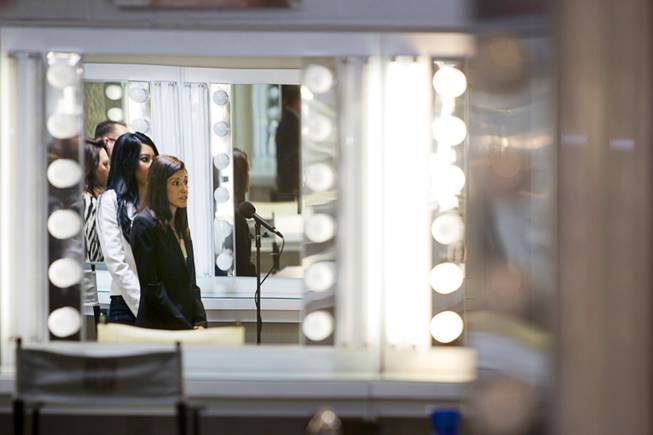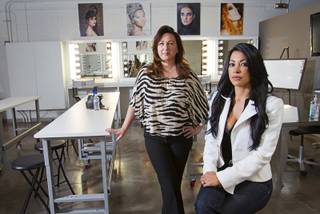
Doran Arik, an attorney with the Institute for Justice, speaks during a news conference at the L Makeup Institute in the Holsum Lofts Tuesday, June 19, 2012. Makeup artists Wendy Robin and Lissette Waugh, with help from the Institute for Justice law firm, have filed a federal lawsuit against the Nevada Board of Cosmetology. The board doesn’t require makeup artists to get cosmetology licenses but requires makeup artist instructors to get licenses to teach cosmetology, they said.
Wednesday, June 20, 2012 | 2 a.m.
Sun coverage
All Lissette Waugh and Wendy Robin wanted to do was teach the art of makeup application in the Las Vegas area.
But the state of Nevada said they couldn’t do so without first obtaining cosmetology licenses or having their businesses licensed as cosmetology schools, even though Waugh and Robin say their craft has nothing to do with cosmetology.
So now the two teachers are challenging the Nevada State Board of Cosmetology’s contention they need to be licensed as cosmetology or aesthetics instructors, saying the requirement is unconstitutional.
Waugh, who operates the L Makeup Institute in Las Vegas, and Robin, who opened the now-defunct Studio W in Henderson, filed a lawsuit Tuesday in U.S. District Court against the state board.
The two are makeup artists, working mostly in television, films, advertising and modeling. They use specialized techniques, including the application of airbrushed makeup or special-effects makeup.
Both want to run schools to teach these skills to aspiring makeup artists, but doing so in Nevada would require them to be licensed as a cosmetology school, which comes with its own set of requirements, including a minimum 5,000-square-foot teaching space and the installation of equipment — like shampooing sinks — needed to teach the entire cosmetology curriculum, not just makeup artistry.
“The state board has told them if they want to teach makeup artistry, they must also teach Nevada’s entire cosmetology curriculum, including classes on how to cut and style hair, how to do facials and eyebrow waxing, manicures,” said attorney Doran Arik of the Virginia-based nonprofit Institute for Justice, which brought the suit on behalf of Waugh and Robin. “(These are) things that Lissette and Wendy don’t want to teach and that their students don’t want to learn because they have nothing to do with makeup artistry.”
The alternative, running an unlicensed makeup artistry school, could lead to daily fines of $2,000, which prompted Robin to shut down Studio W in 2011, only a few months after it opened. Waugh has managed to keep her downtown Las Vegas-based L Makeup Institute afloat by selling makeup kits to students and then “demonstrating” how the products are applied instead of “teaching.”
In the suit, Waugh and Robin allege that requiring them to teach the entire cosmetology curriculum in order to teach makeup artistry is a restriction of their First Amendment right of free speech and their 14th Amendment right to equal protection and equal treatment under the law.
They are asking the federal court to find the board’s requirement unconstitutional and grant them attorneys’ fees and court costs.
Vincent Jimno, executive director of the Cosmetology Board, said his agency was aware of the complaints by Waugh and Robin and was working to change state law to allow them to operate their makeup artistry schools without a full cosmetology instructor’s license.
“The laws, the ways they are drafted, currently don’t allow them ... to have a limited school,” Jimno said. “Bottom line, cosmetology is the application of makeup and the beautifying of skin. They do makeup, and that falls under the board of cosmetology.”
Jimno said portions of the state’s cosmetology law — which were written decades ago — are archaic and that his agency was working to modernize the regulations. But doing so requires a legislative process, which can’t be accomplished until the Legislature is back in session in 2013.
The lawsuit was unexpected, he said, and will cost his office money and resources to litigate.
He said his agency was concerned foremost with matters of public health, which is why cosmetology regulations are in place.
“Our primary goal is to make sure that no infectious diseases are transmitted by accident,” he said. “That people don’t burn their hair off or put makeup on skin that has medical problems. Without regulations, that’s what you can end up with.”


Join the Discussion:
Check this out for a full explanation of our conversion to the LiveFyre commenting system and instructions on how to sign up for an account.
Full comments policy